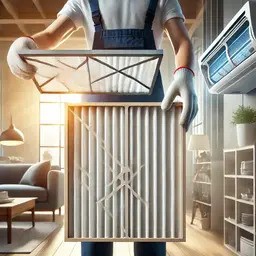

Your HVAC (Heating, Ventilation, and Air Conditioning) system plays a crucial role in maintaining indoor comfort, energy efficiency, and air quality. One of the simplest yet most vital aspects of HVAC maintenance is changing the air filter regularly. But how often should you do it? The answer depends on several factors, including the type of filter, household conditions, and the presence of pets or allergies.
In this article, we'll cover the recommended frequency for changing HVAC air filters, the benefits of doing so, and why it’s important to hire a verified HVAC company, such as those listed on nhvac.org.
The air filter in your HVAC system is responsible for trapping dust, dirt, pet dander, and other airborne particles, preventing them from circulating throughout your home. Over time, filters become clogged, restricting airflow and causing your system to work harder, leading to several issues:
Reduced efficiency – A dirty filter forces your HVAC system to consume more energy, increasing utility bills.
Poor air quality – A clogged filter allows allergens, dust, and pollutants to circulate in your home.
System damage – Overworked HVAC systems are more prone to breakdowns and costly repairs.
Uneven heating and cooling – Restricted airflow can cause temperature inconsistencies in different rooms.
To avoid these problems, it’s essential to replace your air filter at appropriate intervals.
Most HVAC professionals recommend changing the air filter every 1 to 3 months for optimal performance. However, specific conditions may require more frequent changes.
If you don’t have pets and live in a relatively clean environment, you can change the filter every three months. However, if you notice dust accumulation around vents or reduced airflow, consider checking and replacing the filter sooner.
Pet hair and dander can quickly clog air filters, reducing air quality and HVAC efficiency. If you have one pet, change the filter every two months. If you have multiple pets, replace it every month to keep the air clean and your system running smoothly.
If you or someone in your home has allergies or respiratory issues, it’s best to change the filter every month. A clean filter helps remove allergens such as pollen, dust mites, and mold spores, improving indoor air quality and reducing allergy symptoms.
Your HVAC system works hardest during summer and winter, meaning filters accumulate more dust and debris. Changing the filter every month during these peak seasons helps maintain efficiency and comfort.
Some high-efficiency filters, such as HEPA (High-Efficiency Particulate Air) filters, last longer than standard filters. These filters can often be replaced every 6 to 12 months, but it’s still crucial to check them regularly for buildup.
Air filters come in different types, each offering varying levels of filtration and durability. Understanding their differences helps you choose the best one for your needs.
Least expensive option
Provides minimal filtration
Suitable for homes without pets or allergies
Better at capturing dust, pollen, and pet dander
Available in various MERV (Minimum Efficiency Reporting Value) ratings
Ideal for most households
Attracts and captures more particles using static charge
Reusable and washable options available
Suitable for allergy sufferers
Highest level of filtration
Captures 99.97% of airborne particles
Ideal for hospitals, allergy sufferers, and those with respiratory conditions
Even if you follow a recommended replacement schedule, it’s a good idea to check your filter regularly for signs of clogging. Here are some indicators that it's time to replace your filter:
Visible dirt and debris – If the filter looks gray and covered in dust, it’s time to change it.
Increased energy bills – A sudden spike in electricity costs may indicate an overworked HVAC system due to a clogged filter.
Reduced airflow – If air isn’t circulating properly, the filter might be blocked.
More dust in your home – An ineffective filter allows dust to accumulate on surfaces more quickly.
Strange odors – A musty or burnt smell can be a sign of a dirty filter affecting air quality.
While changing an air filter is a simple task, proper HVAC maintenance requires professional expertise. Hiring a qualified HVAC technician ensures that your system runs efficiently and lasts longer. To find a reputable and experienced HVAC professional, always check if they are verified on nhvac.org.
Guaranteed professionalism – Verified HVAC companies meet industry standards and qualifications.
Proper system evaluation – A professional can identify potential issues beyond just a clogged filter.
Energy efficiency optimization – Technicians can recommend the best filter type and system adjustments for better efficiency.
Safety assurance – HVAC professionals ensure proper installation and maintenance, preventing hazards like carbon monoxide leaks.
Changing your HVAC air filter regularly is one of the easiest and most effective ways to maintain system efficiency, improve indoor air quality, and lower energy costs. While general guidelines suggest replacing the filter every 1 to 3 months, your specific household conditions—such as pets, allergies, and seasonal demands—may require more frequent changes.
Additionally, for comprehensive HVAC maintenance, it’s crucial to hire a verified professional. Always choose a company listed on nhvac.org to ensure top-quality service and expertise.
By staying proactive with filter changes and professional maintenance, you can enjoy a healthier, more comfortable, and energy-efficient home all year round.

Quickly increase the confidence of visitors to your website with our trusted HVAC Contractor verification seal & customer feedback & reporting system.
Thousands of consumers across our network trust our research and reviews every single day.
Pass NHVAC standards and proudly display our Trusted seal on your website to show customers you are committed to customer safety and security and value their business.